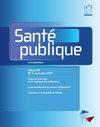Étude pilote d’une intervention de promotion de la santé au sein de clubs de sport
IF 0.3
4区 医学
Q4 PUBLIC, ENVIRONMENTAL & OCCUPATIONAL HEALTH
引用次数: 0
Abstract
Sports clubs (SCs) are an ideal setting for promoting health. However existing health promotion (HP) interventions in SCs mainly target a single health behavior and men who do sports, and evaluations of such interventions provides little information about their deployment. To overcome these limitations, the PROSCeSS intervention was co-constructed based on the theoretical model of the health-promoting SC and multi-level, multi-determinant health strategies. The aim of this pilot study was to evaluate the deployment of the PROSCeSS intervention and identify the factors influencing its deployment. A qualitative study, using recordings of meetings, email and telephone exchanges, and interviews with project leaders of fourteen SC, was carried out. Although a low number of SCs had completed the intervention, they all considered that they have a role to play in helping their members maintain good health. Their ability to develop HP activities and to implement the intervention was influenced by the resources available, the support they received from their sports federation, and the ability of each project leader to get involved in the intervention. The SCs that deployed the intervention implemented several strategies enabling them to integrate health into the organizational, social, economic, and environmental habits of the SCs and to develop new HP activities, such as adapted sports activity sessions and activities to teach members about first aid, nutrition, and good practices for warming up. This study highlights the importance of understanding the specificities of the contexts in which HP interventions are deployed. Having led to a reworking of the intervention steps and the development of an appropriate evaluation design, it also highlights the essential role of pilot studies in the development and evaluation of interventions.体育俱乐部健康促进干预试点研究
体育俱乐部(SC)是促进健康的理想场所。然而,现有的体育俱乐部健康促进(HP)干预措施主要针对单一的健康行为和从事体育运动的男性,对此类干预措施的评估几乎没有提供有关其部署情况的信息。为了克服这些局限性,我们根据促进健康的 SC 理论模型和多层次、多决定因素的健康策略,共同构建了 PROSCeSS 干预方案。本试点研究旨在评估 PROSCeSS 干预措施的部署情况,并确定影响其部署的因素。我们利用会议记录、电子邮件和电话交流,以及对 14 个 SC 的项目负责人进行的访谈,开展了一项定性研究。虽然完成干预的 SC 数量较少,但他们都认为自己在帮助其成员保持健康方面可以发挥作用。他们开展保健活动和实施干预措施的能力受到可用资源、体育联合会对他们的支持以及每个项目负责人参与干预措施的能力的影响。实施干预措施的 SC 实施了几项战略,使他们能够将健康融入 SC 的组织、社会、经济和环境习惯中,并开发新的 HP 活动,如调整体育活动课程和向成员传授急救、营养和热身良好做法的活动。这项研究强调了了解实施保健干预措施的具体情况的重要性。在重新制定干预步骤和开发适当的评估设计之后,本研究还强调了试点研究在开发和评估干预措施中的重要作用。
本文章由计算机程序翻译,如有差异,请以英文原文为准。
求助全文
约1分钟内获得全文
求助全文
来源期刊

Sante Publique
PUBLIC, ENVIRONMENTAL & OCCUPATIONAL HEALTH-
CiteScore
0.40
自引率
33.30%
发文量
252
审稿时长
>12 weeks
期刊介绍:
La revue Santé Publique s’adresse à l’ensemble des acteurs de santé publique qu’ils soient décideurs,
professionnels de santé, acteurs de terrain, chercheurs, enseignants ou formateurs, etc. Elle publie
des travaux de recherche, des évaluations, des analyses d’action, des réflexions sur des interventions
de santé, des opinions, relevant des champs de la santé publique et de l’analyse des services de
soins, des sciences sociales et de l’action sociale.
Santé publique est une revue à comité de lecture, multidisciplinaire et généraliste, qui publie sur
l’ensemble des thèmes de la santé publique parmi lesquels : accès et recours aux soins, déterminants
et inégalités sociales de santé, prévention, éducation pour la santé, promotion de la santé,
organisation des soins, environnement, formation des professionnels de santé, nutrition, politiques
de santé, pratiques professionnelles, qualité des soins, gestion des risques sanitaires, représentation
et santé perçue, santé scolaire, santé et travail, systèmes de santé, systèmes d’information, veille
sanitaire, déterminants de la consommation de soins, organisation et économie des différents
secteurs de production de soins (hôpital, médicament, etc.), évaluation médico-économique
d’activités de soins ou de prévention et de programmes de santé, planification des ressources,
politiques de régulation et de financement, etc
 求助内容:
求助内容: 应助结果提醒方式:
应助结果提醒方式:


